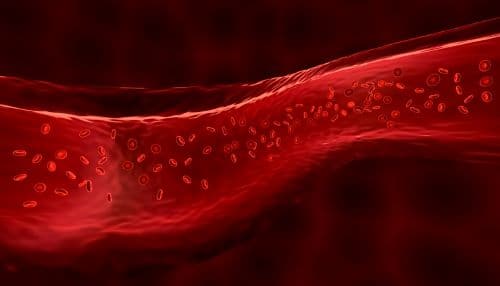Healthy aging largely depends on just one factor.
If you have this single crucial marker of wellness, chances are that you will not get heart disease or suffer a stroke. You’ll likely avoid dementia. If you’re a man, you won’t have to worry about erectile dysfunction.[i]
The condition of your blood vessels affects virtually every aspect of your health. When your veins, arteries, and capillaries are narrow, rigid, or blocked it reduces blood flow. This leads to the familiar diseases of aging we’re all trying to avoid.
Mainstream medicine’s solutions for blood vessel health include statin drugs, blood-thinning medications, heart stents, and bypass surgery.
A new study reveals a safer, better remedy to keep blood flowing freely throughout your body.
Researchers reported their discovery in the British Journal of Nutrition. They looked at diet and health data from 684 people. They found that those who ate cruciferous vegetables regularly were much less likely to have calcium buildup in their aortas.[ii]
Calcium buildup causes hardening of the arteries. It’s what doctors call atherosclerosis. It’s dangerous anywhere, but particularly in the aorta. It’s the main artery that carries blood from your heart to the rest of your body. When it’s blocked by calcium it can trigger stroke and long-term damage to organs.[iii]
The researchers found you don’t have to eat a lot of cruciferous vegetables to keep your aorta clear. Subjects who ate more than an ounce and a half a day had a 46% lower chance of having aortic calcium.
That translates to ¼ cup of steamed broccoli or ½ cup of raw cabbage.
The researchers think one vitamin gives cruciferous vegetables their blood vessel cleaning power.
“One particular constituent found abundantly in cruciferous vegetables is vitamin K,” said lead researcher Dr. Lauren Blekkenhorst. Vitamin K inhibits blood vessel calcification.[iv]
The Nutritional Secret for Better Blood Vessel Health
Cruciferous vegetables include not only broccoli and cabbage, but cauliflower, Brussels sprouts, arugula, kale, and bok choy.
Eat at least one serving of cruciferous vegetables a day to keep your blood vessels healthy. Buy organic, if possible.
On days when you don’t eat cruciferous vegetables—or if you don’t like them—take a vitamin K supplement. Look for one that includes both K1 and K2 forms. But make sure that you take it with a meal, preferably one with some healthy fats. Vitamin K is fat soluble. Taking it with olive oil, avocado, wild-caught fish, or organic beef will help your body absorb it.[v]
Don’t take vitamin K if you are on the blood-thinning drug warfarin (Coumadin). Vitamin K can counteract the medication.[vi]
There’s one other thing that’s crucial to blood vessel health…
The lining of your blood vessels is made up of endothelial cells. Inflammation from things like smoking, air pollution, and a high-carb sugary diet can prematurely age these cells and harm your blood vessels.
Red wine, however, counteracts this. It contains phenol, a natural organic compound. Phenol stimulates the formation of nitric oxide, which is a rich “fertilizer” for endothelial cells. It keeps them healthy and strong.[vii]
This anti-inflammatory effect is why red wine is linked to better heart health, lower stroke and cancer risk, and increased longevity.[viii]
But what kind of red wine is best?
Dr. Roger Corder is a heart researcher at the William Harvey Research Institute in London. He wrote the best-selling book The Red Wine Diet.
Most of red wine’s health benefits come from one group of phenol compounds called procyanidins, he says.
The wine highest in procyanidins is Madiran. It’s made in the southwest of France primarily from the tannat grape. It’s not easy to find in the U.S. But most big wine shops usually have at least a couple of bottles.[ix]
If you can’t find it, go for cabernet sauvignon. It is also high in healthy procyanidins. And it’s widely available in wine shops and online.
Nature provides the best ways to keep life-giving blood flowing through your body, optimizing your health as you get older.
Editor’s Note: Independent Healing is your number one source for evidence-based natural health solutions. Each month we bring you non-biased, science-backed medical advice from the world’s top researchers. To subscribe, go HERE.
Related Articles
Scientists: One Strange Fruit Slows Aging
10 Foods That Delay Brain Aging
The Invisible Toxin That’s Damaging Your Heart
Like this Article? Forward this article here or Share on Facebook.
[i]https://www.ahajournals.org/doi/10.1161/JAHA.116.004389
[ii]https://www.cambridge.org/core/journals/british-journal-of-nutrition/article/cruciferous-vegetable-intake-is-inversely-associated-with-extensive-abdominal-aortic-calcification-in-elderly-women-a-crosssectional-study/D41FFFF020A58DC9A70C6320ADD86058
[iii]https://www.tgh.org/services/heart-vascular/cardiovascular-conditions/aortic-diseases/diseases-treated/aortic-occlusion
[iv]https://medicalxpress.com/news/2020-08-broccoli-brussels-blood-vessel-health.html
[v]https://www.hsph.harvard.edu/nutritionsource/vitamin-k/
[vi] https://www.stoptheclot.org/news/vitamin-k-and-coumadin-what-you-need-to-know/
[vii]http://www.rdmag.com/article/2016/11/red-wine-can-counteract-short-term-impact-smoking
[viii]http://www.medicaldaily.com/red-wine-burns-fat-and-lowers-blood-pressure-plus-5-other-health-benefits-winos-321382
[ix]http://www.winemag.com/2007/11/20/opinion-the-most-heart-healthy-wine

